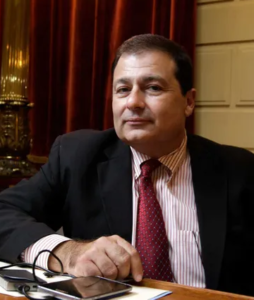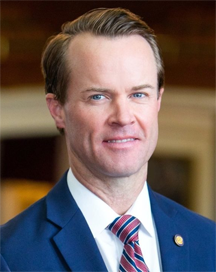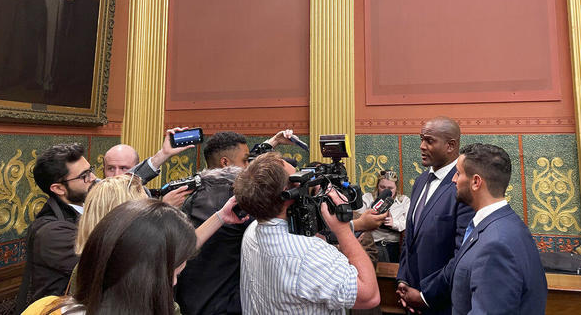Election Brings New Leadership in State Legislatures
Although 2020’s state legislative elections brought about a “historically low” number of flipped chambers, a number of states will have new legislative leaders in 2021.
The biggest change, of course, was in New Hampshire, which where both the House and Senate switched from Democratic to Republic control. Together with the state’s Executive Council, which also changed hands, the Republican wins gave Gov. Chris Sununu a rare quadfecta and, with it, a free hand to set state policy until at least 2023.
Republican members of the New Hampshire Senate unanimously selected Minority Leader Chuck Morse to again serve as president of the chamber in 2021. Morse had led the Senate from 2013 until 2018, when control shifted to the Democrats. House Republican Leader “Dick” Hinch, who served as majority leader when the GOP last held the House, is expected to be tapped as speaker, but Rep. Al Baldasaro of Londonderry announced last week that he too would seek that post. Republicans will caucus on Nov. 20, two weeks before the new speaker is formally elected on the legislature’s Organization Day, Dec. 2.
Even in state legislative chambers that remain controlled by the same party, however, many chambers across the nation will be under new leadership next year.

Rhode Island Speaker-elect Joe Shekarchi
In Rhode Island, for example, House Speaker Nicholas Mattiello lost his re-election bid to the wife of his hometown’s Republican mayor. Long besieged from both the left and right, the conservative Democrat would have faced a “progressive” challenge to his speakership if he had won re-election. In his absence, however, Mattiello’s House colleagues quickly rallied around his deputy, House Majority Leader K. Joseph Shekarchi, a four-term Democratic legislator from Warwick, setting him up to become speaker in a House Democratic caucus just 24 hours after the polls closed. Rep. Christopher Blazejewski will assume Shekarchi’s post as majority leader.
Outside of the legislature, Shekarchi is perhaps best-known for managing Gov. Gina Raimondo’s first statewide campaign, for state treasurer.
In the upper house, Senate President Dominick Ruggiero’s leadership team remains intact, after handily beating back a similar challenge Friday from his caucus’s more liberal wing.
Another House Speaker who lost her seat is pinning her hopes on a recount. In Vermont, Speaker Mitzi Johnson has for the past two years shared her multi-member Grand Isle-Chittenden District with Republican Rep. Leland Morgan. This year Morgan recruited his nephew Michael Morgan to enter the race as well, and together they unseated Johnson by an 18-point margin.
Assuming that result holds, four House members have now announced plans to run for speaker. Both Majority Leader Jill Krowinski of Burlington and former majority leader Rep. Sarah Copeland Hanzas of Bradford want the job, as does Rep. Charlie Kimbell of Woodstock, the ranking member of the House Commerce and Economic Development Committee, who styles himself as “less partisan” than his competitors. Also seeking the position is outgoing Rep. Cynthia Browning, who lost her re-election bid last week, but who points to House rules that do not require the speaker to be a sitting member of the chamber.
Krowinski and Copeland Hanzas were also in the mix in 2016 when former speaker “Shap” Smith ended his 8-year tenure as speaker.
In the Vermont Senate, President Pro Tempore Tim Ashe did not run for re-election, instead mounting an ultimately unsuccessful campaign for lieutenant governor. The entire Democratic Senate delegation has endorsed Majority Leader Becca Balint to succeed him. Jockeying to succeed Bailint as majority leader are Sens. Chris Pearson of Chittenden, Alison Clarkson of Windsor and Brian Campion of Bennington. Clarkson and Campion are Democrats; Pearson, a former campaign aide to U.S. Sen. Bernie Sanders, is a member of the Vermont Progressive Party, which caucuses with the majority Democrats. Despite the fact that he is not a Democrat, Pearson so far seems to have the edge in this contest.
Whoever leads the Vermont legislature in 2021, however, will face tougher odds standing up to Republican Gov. Phil Scott. The majority coalition of Democrats and Progressives together lost seats in both the House and Senate. The new House majority will consist of 92 Democrats and 7 Progressives – one shy of the number needed to override Gov. Scott’s vetoes. The Senate majority consists of 23 Democrats and 2 Progressives, vs. only 7 Republicans.
Elsewhere in New England, both Maine and Connecticut will have new House speakers in 2021. In Maine, Sara Gideon ran for U.S. Senate rather than seek re-election, while Connecticut Speaker Joe Aresimowicz also chose to step down this year. (A Republican subsequently captured Aresimowicz’s House seat.) Succeeding Aresimowicz will be Majority Leader Matt Ritter of Hartford, whose father served three terms as speaker in the 1990s and whose mother is a long-serving judge recently named to the state Supreme Court. Finance Chair Jason Rojas of East Hartford has been chosen in caucus as majority leader.
Connecticut’s minority-party leadership is also in flux after longtime House Republican Leader Themis Klarides decided against seeking re-election. House Republicans unanimously chose Rep. Vincent Candelora of North Branford to fill her shoes.
The Connecticut Senate will again be led by President Pro Tem Martin Looney of New Haven, but Republican Kevin Kelly of Stratford won over his 12-member caucus to succeed retiring Republican Leader Len Fasano. Kelly will be assisted by Sen. Paul Formica, a restaurateur from East Lyme.
Maine Democrats are caucusing this week to determine who succeeds Sara Gideon as speaker. Senate Republicans on Tuesday promoted Assistant Minority Leader Jeff Timberlake of Turner to succeed Minority Leader Dana Dow, who was unseated last week by first-term Rep. Chloe Maxmin. Sen. Matt Pouliot of Augusta will take over as Timberlake’s assistant.
Other minority leaders around the country who were defeated in the Nov. 3 election were Bob Trammell of Georgia, Anthony Hensley of Kansas and Frank Dermody of Pennsylvania. All are Democrats.
In Delaware, it was the Senate president pro tempore who lost his seat, not in the general election but in the September party primary. David McBride was unseated by left-leaning social worker Marie Pinkney, and last week the Delaware Senate replaced the rest of his leadership team with a more progressive slate. Sen. Dave Sokola of Newark will be the next speaker, while Bryan Townsend of Newark and Elizabeth “Tizzy” Lockman of Wilmington will become majority leader and majority whip, respectively.
Iowa also got a new Senate president. Sen. Jake Chapman of Adel was selected to succeed Republican Speaker Charles Schneider of West Des Moines, who did not seek re-election. Sen. Jack Whitver of Ankeny will continue as majority leader.
Vote-counting still continues in Nevada, where at last report Senate Majority Leader Nicole Cannizzaro led her Republican challenger by just 841 votes.
In Illinois, a political drama played out as Republicans threatened to ally with renegade Democrats in their effort to oust House Speaker Mike Madigan of Chicago. House Republicans would ordinarily cast token votes on behalf of their own minority leader, but are signaling they would throw their support to any Democratic challenger who could peel away enough votes to remove the current speaker.
When the 2021 term begins, Republicans will hold 46 seats to the Democrats’ 72, which means that a revolt by as few as 14 Democrats could tip the balance. At least 8 House Democrats have so far signed on to the campaign to unseat Madigan, but they have not coalesced around a single candidate for speaker. Rep. Stephanie Kifowit of Oswego last month announced she would challenge Madigan, but none of her House colleagues have yet endorsed her bid.
This week’s decision to delay the Illinois legislature’s so-called veto session was seen as “a strong signal that the speaker is weak,” in the words of one Republican member. Legislative leaders instead cited members’ “concerns about the rising COVID-19 rates and proximity to upcoming holidays.”

Texas Rep. Dade Phelan
Another war is flaring in Texas, where Republican Rep. Dade Phelan of Beaumont claims to have garnered enough votes to be chosen as House Speaker. The head of the state Republican Party calls him a “traitor.” Seven other candidates, including four Democrats, are also angling for the post.
Phelan, a top aide to outgoing Speaker Dennis Bonnen, claims to have collected commitments from 57 Republicans and 49 Democrats, far more than he needs to lead the 150-member House. But party chairman Allan West castigated Phelan for recruiting Democratic supporters.
West assumed the party chairmanship in July after ousting former leader James Dickey, in a campaign in which he also called on Bonnen to resign. Previously a one-term Florida congressman, West was a high-profile member of the House Tea Party Caucus.
In Michigan, Republicans have selected Speaker Pro-Tempore Jason Wentworth of Farwell to be their next House speaker. The current speaker, Lee Chatfield of Levering, is term-limited. Education Committee Chair Pamela Hornberger will ascend into Wentworth’s position as speaker pro-tempore. House Democrats selected Rep. Donna Lasinski of Scio Township to lead their caucus, succeeding current Democratic Leader Christine Grieg.
Colorado Democrats also voted to replace a term-limited speaker. Rep. Alec Garnett of Denver ran unopposed to succeed Speaker KC Becker of Boulder. However, a spirited four-way contest for majority leader ended with House Democrats selecting Rep. Daneya Esgar of Pueblo for that post.
In Oregon, two-term Rep. Janelle Bynum of Happy Valley announced Monday that she will challenge House Speaker Tina Kotek. Senate President Peter Courtney, who is seeking his tenth term in that post, is not expected to face a challenger, but two senators, James Manning Jr. of Eugene and Ginny Burdick of Portland, are competing for the role of president pro tem.
Georgia Republicans on Monday renominated House Speaker David Ralston and his entire leadership team, in the face of a challenge by three-term Rep. David Clark. Clark was among a handful of legislators who criticized Ralston’s rule, but most of his fellow rebels did not seek re-election.
Florida Rep. Chris Sprowles of northern Pinellas County was chosen by his party in September 2019 to succeed Speaker Jose Oliva as of Nov. 17. Upon winning re-election, Sprowles announced his leadership team this week. Rep. Paul Renner of Palm Coast is already in line to succeed Sprowles as speaker in November 2022.
In Ohio, Senate Republicans tapped Sen. Matt Huffman of Lima to succeed current President Larry Obhof of Medina. Sen. Jay Hottinger of Newark will become president pro tempore, Sen. Kirk Schuring of Canton will be majority floor leader, and Sen. Rob McColley of Napoleon will serve as majority whip.
Wisconsin Republicans tapped Sen. Devin LeMahieu of Sheboygan to replace Scott Fitzgerald as majority leader.


